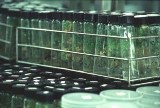Low-Cost Synthetic Form of Artemisinin May Provide Solution in Malaria Battle
January - February, 2008 | Volume 7, Issue 1
Scientists hope a low-cost, semi-synthetic form of artemisinin manufactured through a fermentation process will make life-saving therapies available to the most vulnerable malaria sufferers who cannot afford actual artemisinin.
Derived from the leaves and inflorescences of the Chinese plant Artemisia annua, or sweet wormwood, artemisinin takes over a year to mature, making it an expensive product. In addition, Asian growers are unlikely to be able to meet the projected global demand.
Scientists from the University of California at Berkeley are collaborating with private industry and non-profit organizations to improve this situation by producing strains of baker's yeast that can also synthesize the compound. By inserting plant genes into the yeast cells, all of the chemical steps needed to produce artemisinin can be accomplished in a much more efficient package. Not only can the yeast forms produce artemisinin at a faster rate--they can produce a purer compound compared to the extracts from cultivated plants.

Tissue cultures of Artemsisia annua.
Photo: WHO/Tropical Diseases
Research/Crump.
The scientists involved believe that this will allow better access to artemisinin-based treatments for patients in Africa and other malaria-endemic regions, especially in areas where A. annua does not grow. Additionally, by ensuring that all synthesized artemisinin ends up in combination therapies rather than monotherapies, the researchers hope to delay the evolution of resistance.
Microbially Derived Artemisinin: A Biotechnology Solution to the Global Problem of Access to Affordable Antimalarial Drugs. Hale V, Keasling JD, Renninger N, Dagana TT. Am. J. Trop. Med. Hyg. 77 (Suppl 6) 2007, pp. 198-202.
To access the paper, visit: http://www.ajtmh.org/cgi/content/full/77/6_Suppl/198
To view Adobe PDF files,
download current, free accessible plug-ins from Adobe's website.
Related Global Health Research Topics